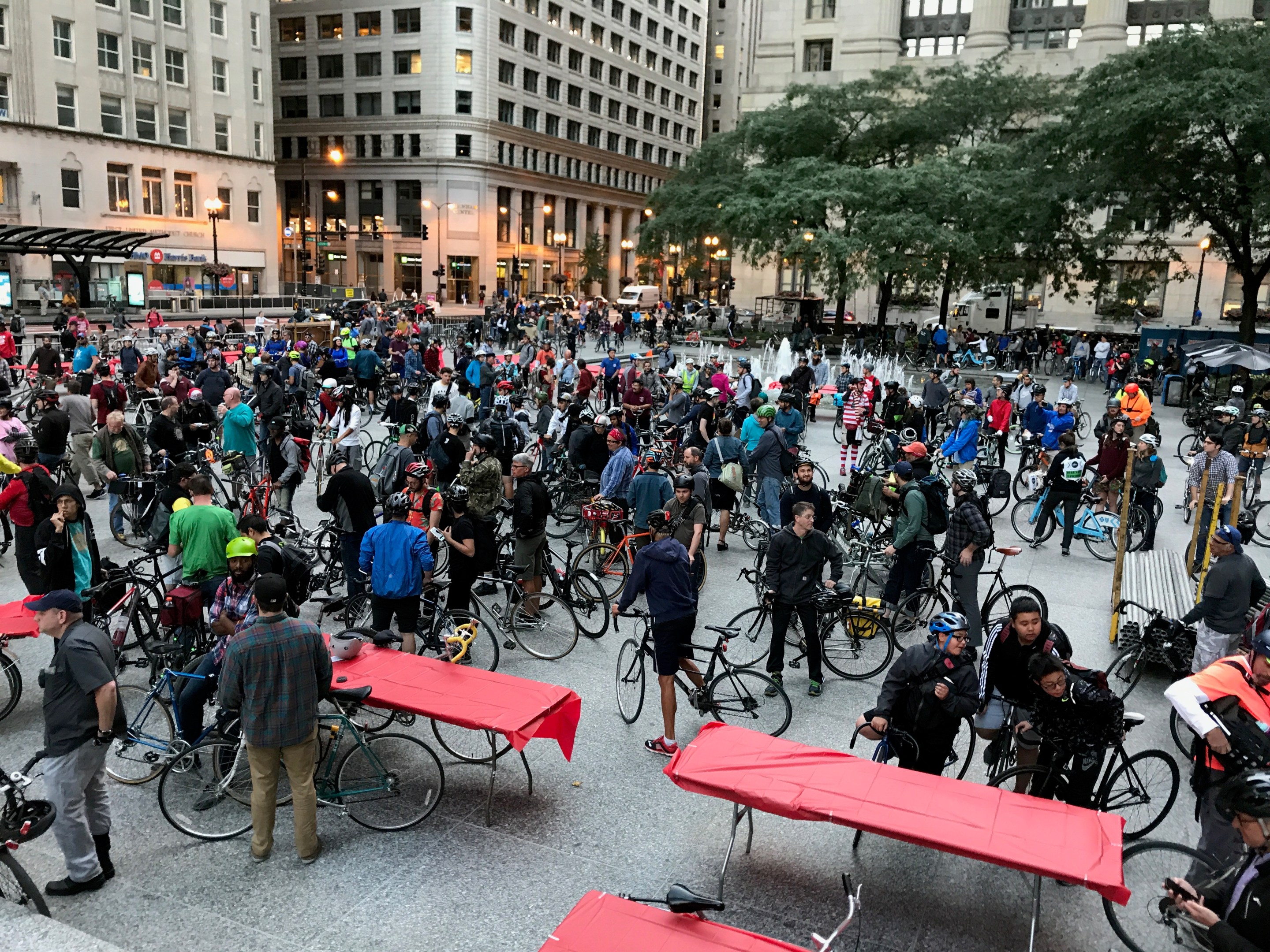Due to word count limitations in my Chicago Reader column about the history and influence of Chicago Critical Mass on the occasion of the 20th anniversary of the monthly rides, I wasn't able to include many quotes from riders I interviewed before, during, and after last Friday's ride. I thought Streetsblog readers would be interested in reading what these people had to say, so here's some additional discussion of the significance of the ride.
Oboi Reed, cofounder of Slow Roll Chicago, which promotes biking on the South and West sides, told me that, in addition to the African-American cycling group Red Bike and Green, Critical Mass is one of the reasons he became comfortable riding on city streets -- previously he only put his bike in the trunk of a car and drove to the Lakefront Trail. “I thought you all were crazy for riding in the street, and now I’m zipping in and out of traffic," he said. “It was riding in a group and being a little bit insulated that helped me find my comfort zone.”
Reed noted that large Slow Roll Chicago group rides are conducted differently than Critical Mass events, with Slow Roll squad leaders riding in front, behind, and alongside the group to help shepherd participants and minimize the chance of conflicts with motorists. "Critical Mass is leaderless, and Slow Roll is 'leader-ful'," he noted. "Our target audience is people who don't [usually] ride, who may not feel safe riding on the street, and the only way they're going to feel safe riding on the street is because they're riding with us... So we that we're responsible for providing an organized environment that allows everyone to feel safe and comfortable."
Reed also confirmed that there were concerns that Slow Roll rides, which are largely made up of cyclists of color, might be more likely to be stopped by police if they are perceived as being disorderly than Critical Mass rides, which tend to be majority-white (but have become more diverse in recent years.) "That said, I completely love and respect Critical Mass, and I certainly have been inspired by participating."
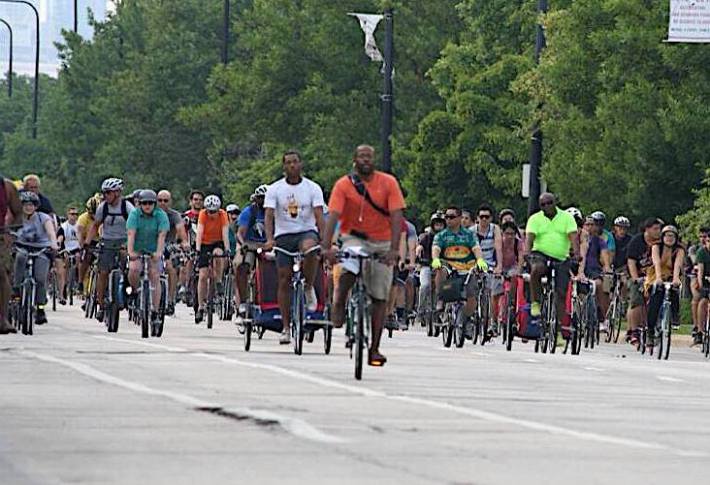
Derek Brown and Germaine Minor, who run the North Lawndale-based, co-ed youth boxing program Boxing Out Negativity led a group of 14 kids on a ride from the neighborhood to the plaza for the anniversary ride. “The main objective of our organization to get kids out of negative environments and put them in a safe zone,” Minor said. “This ride is a chance for them to experience different communities.” He points to his charges perched on the Picasso. “Look at them, they’re sliding all down that thing, just being kids having fun.”
Steve Timble, a longtime ride participant who works at the Wall Street Journal, told me the anniversary ride is a chance to reflect on how far Chicago cycling has progressed since the late Nineties. “20 years ago it was Mad Max, it was a survival struggle when you rode your bike in the city, and now you don’t need to be super-skilled to use your bike here, and that’s great.”
Violet Doyle, a sign language interpreter who’s been riding in the Mass for two years said she appreciates the event as an chance to enjoy cycling without the usual stresses of sharing the road with cars. “I commute every day on my bike and it feels like I’m always fighting danger. Critical Mass is like a safe space for us to promote biking.”
Rob Hernandez, who works as an exterminator, had ridden his fixed-gear bike up Ogden Avenue with friends to the plaza from his home in southwest-suburban Stickney. He’s ridden in the Mass for the past few years. “It’s a great time for family and friends to get together, and it helps make drivers more aware of bike on the road,” he said.
Rishan Mohideen, who manages the West Loop bike and triathlon shop Live Grit, said that Critical Mass' 20th Anniversary is proof that urban cycling culture is only growing stronger. "My job is getting people out on bikes, getting people outside and enjoying themselves," he said. Seeing this many people show up, on every type of bike, makes me excited for the future."
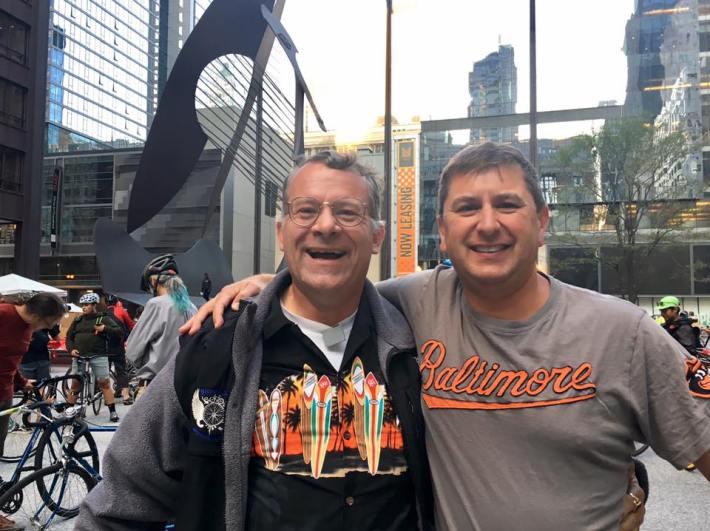
Mark Counselman, an early Critical Mass rider and Chicago Department of Transportation bikeways planner, came back to our city from Baltimore for the ride. He said Critical Mass played a key role in him getting the CDOT job, since it was through the ride that he became active in pushing for the return of bike lanes on Halsted Street that were blacked out on the orders of then-44th Ward alderman Bernie Hansen. "I wrote so many damn letters that [CDOT bike coordinator] Ben Gomberg essentially said, let's just put this kid on the payroll."
Aurora, a fine artist, graphic designer, and former organizer of UFO conferences, was active in Chicago Critical Mass in the early-to-mid-2000s and now lives in the Bay Area. She happened to be back in town visiting family, so she showed up for the anniversary ride. "I'm so happy to see that this ride is still going because I feel that not enough has changed in terms of sustainable transportation for a significant portion of the world," she said. "The fact that cars are not getting phased out any time soon is really sad to me. The Critical Mass community helped educate me about these issues."
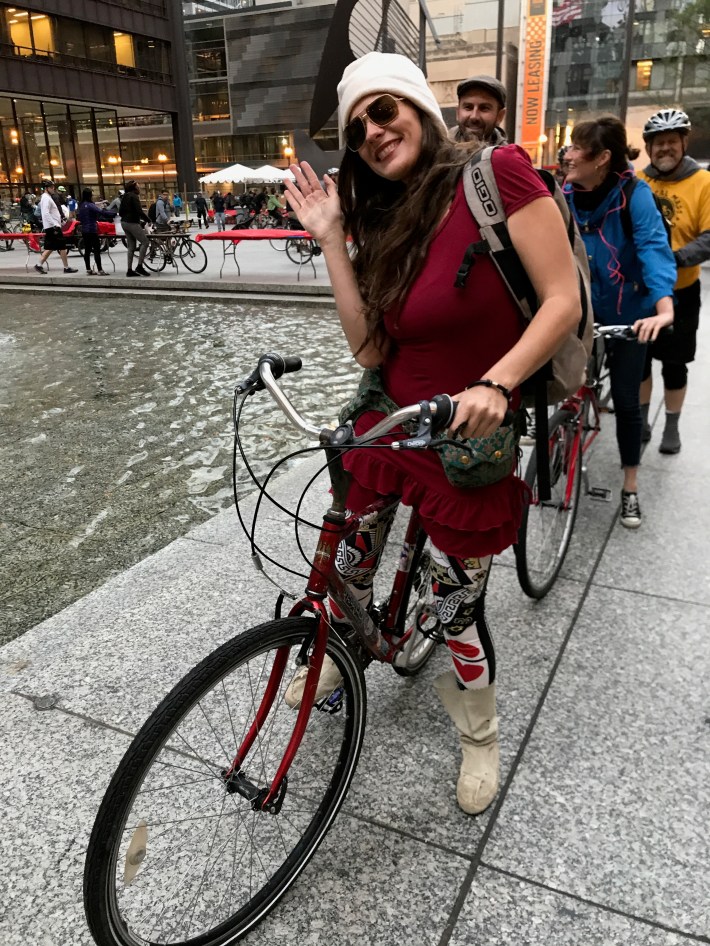
Karl Szwet, an HVAC technician from Highland, Indiana, who's been riding with the Mass for many years, told me a story about the early days, when participants posted flyers in Spanish in Pilsen days before the ride to alert residents that the ride would be coming their way for the first time. “So when the Critical Mass did go through the neighborhood, everybody was out. Every porch had people on it waving and clapping, and all the lights were on. It was so exciting to see it -- it was like we had bridged something there.”
Sydney Jones, a courier from the South Chicago neighborhood who had only done Critical Mass once before, told me afterwards that she had a blast on the anniversary ride. “It was this fun, hipster-y thing. It’s like you get to own the city for the night.”
Fabian Carmona, who works for R.R. Donnelly printing company and lives in the South Loop is a daily bike commuter. "I think it's pretty mind-blowing that we took over the streets of Chicago," he said at the after-party. "Everybody was supportive, all the people driving and all the people having dinner outside, they were all like, 'Yeah!' It's great to see people supporting cycling because not only to you save money, but it's good for the environment. I look forward to doing the next one."
Steven Lane, a graphic designer and brewer, is a longtime Critical Mass participant who helped lead the anniversary ride. The highlight of the evening was when cyclists took over a portion of Lake Shore Drive, something that the Mass hadn't done for years. "It was a gorgeous night, and that's a portion of the drive that I consider pretty sacred. The moment when I first fell in love with Critical Mass years ago was when we were passing by Buckingham Fountain on LSD in twilight."
Earl Jackson, a math teach from Avalon Park who has been participating in Critical Mass for three years, and his friend were riding bikes covered with Christmas lights. "There was a lot of participation on the ride tonight, the weather was nice, and there was some nice scenery," he told me afterwards. "The people I met on the ride were really friendly and the people on the sidewalks were seemed surprised and welcoming as the ride came through. It seems like Chicago supports bike riding. I think it's an awesome event -- people meeting each other from all types of communities is a wonderful thing. I think it brings the city together."
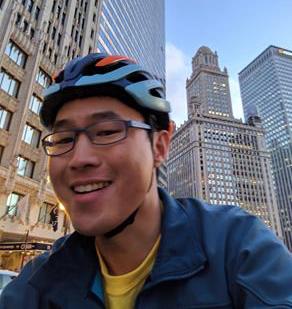
Payton Chung, a founding parent of Chicago Critical Mass (who also previously served as editor-at-large for Streetsblog), now works for the Urban Land Institute in Washington, D.C. and came back to Chicago for the anniversary. He said that it was particularly gratifying for him to bike on Milwaukee Avenue in Wicker Park, where CDOT recently implemented a complete street overhaul with new bike lanes, sidewalk extensions, and slip lane removals, because he had advocated for these changes as a resident in the late 2000s.
Chung was also pleased by the friendly reception the ride got from bystanders. "Overall the attitude of onlookers was very chill," he said. "People really seem to be buying into the idea that this is a fun Friday bike ride and a way to welcome the weekend and to enjoy being out on a lovely night, instead of an aggressive way to assert control of streets. It's clear that the 'Happy Friday' mentality is alive and well."
